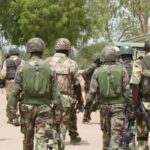The misconception of ethnicity and religion have descended Jos, the Plateau State capital from the lofty height of Nigeria’s tourist city to a dreadful home of ‘red spills’.
Today, many plateau communities are terribly faced by serious conflicts relating ethnicity or religion over which the people have been wagging tongues.
- Secrecy in govt undermines access to information — Guild of Editors
- PODCAST: Do People Living With HIV Still Face Discrimination?
Violent eruptions linked to ethnicity and religion have, overtime, posed grave dangers to the people of the state with innocent commuters paying the ultimate price of a conflict they know nothing about. The worse, they are only involved because of their ethnicity, religion or cultural orientation.
People of the state have dissenting views with respect to ethnicity and religion so much so that they became grossly intolerant to their opposing beliefs and values such that Christian-majority areas across strategic locations are being prohibited to adherents of Islam and vice versa.
It will cost an earthquake for one to see for example, members of the Hausa-Fulani Muslim majority supporting ideas emanating from the Berom tribal group whose overwhelming proportion are Christians.
Obviously, no single religious group is willing to sincerely embrace another in the state thereby making every minor disagreement capable of sparking palpable tension amongst the people.
As it stands, a number of places in the state are presently tagged as “no-go areas”. This means they can only be inhabited by a certain group of people.
The compounding level of hatred has led to some gruesome killings of many civilians and destruction of properties over the past few years which is due certainly to the erroneous understanding of religious ideals and misrepresentation of ethnic philosophies and values.
Plateau is, for instance, far less diverse when compared to Lagos or Rivers states where millions of Muslims, Christians, natives, settlers and foreigners of different faiths and cultural backgrounds have been co-habiting peacefully.
Lagosians and residents of Port Harcourt have, notwithstanding their sociocultural disparities, chosen to live peacefully and never allow themselves to be polarized along ethnic or religious lines.
It is instructive to note that the two cities are more developed, more integrated and far more convenient for living than Plateau, where in recent times, the people appear more determined in seeking revenge than engaging in dialogue.
Conflict is contrary to the preaching of Islam and Christianity and very odd to the practice of any African tradition.
It is high time, therefore, that all Plateau Muslims and Christians, indigenes and settlers understood that ‘all of us is better than none of us’ so as to cease the merciless killings and destruction.
Also, the authorities in Plateau must do whatever it takes to restore the state’s fading glory of being ‘Home of Peace and Tourism’ and make the people harness the diversity for the best of all.
Shekarau sent this piece via [email protected]
 Join Daily Trust WhatsApp Community For Quick Access To News and Happenings Around You.
Join Daily Trust WhatsApp Community For Quick Access To News and Happenings Around You.


